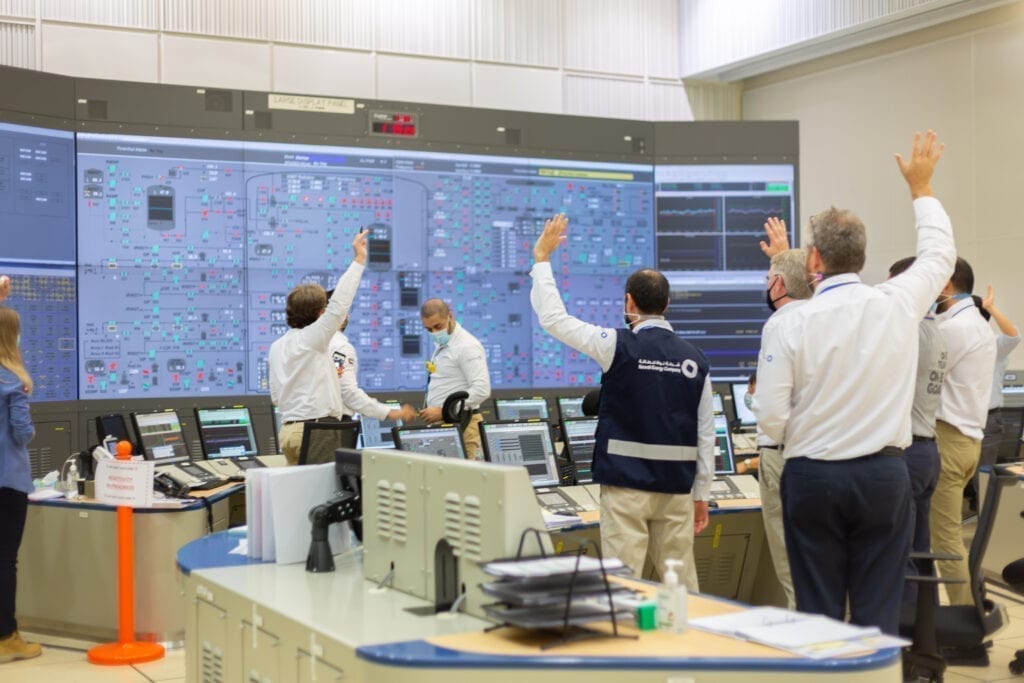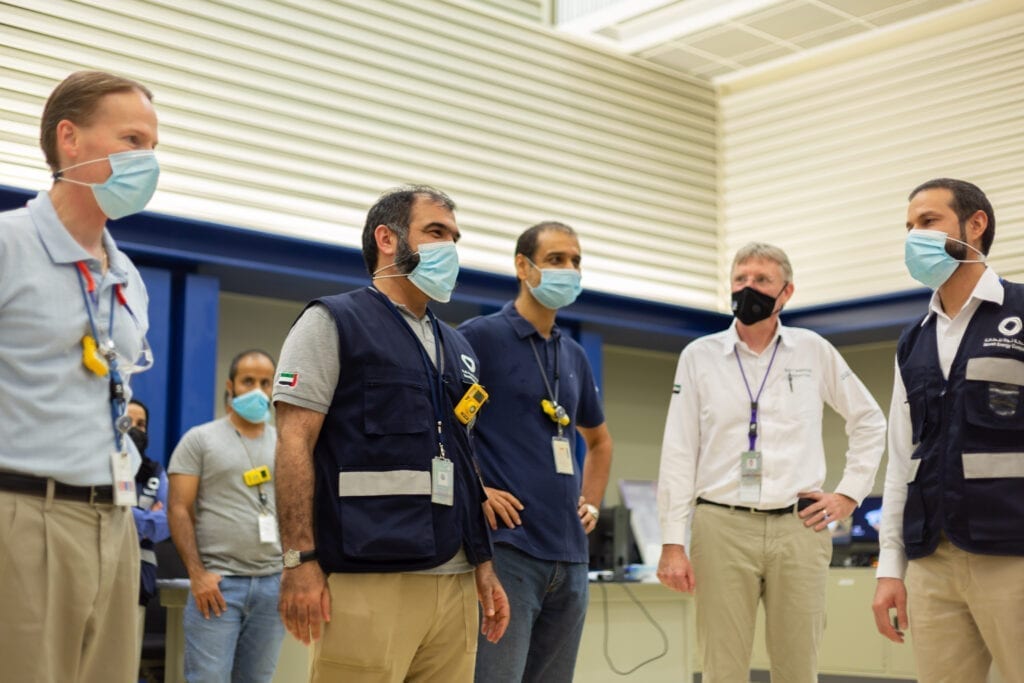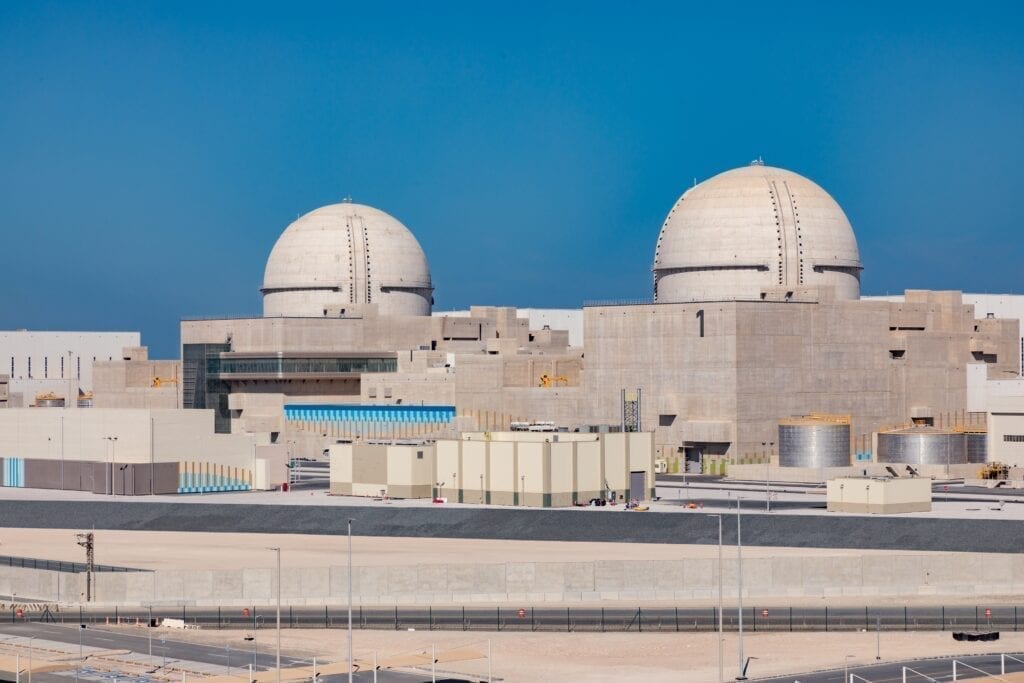Arab World's First Nuclear Plant Starts Up
Unit 1 of the Barakah Nuclear Energy Plant, the first nuclear power facility in the United Arab Emirates (UAE), achieved successful startup August 1. It’s another milestone in the process to deliver power from the project to the UAE grid, with commercial operation of Barakah expected later this year.
The startup of Unit 1 marks the first time the reactor safely produces heat to create steam and turn a turbine to create electricity. Emirates Nuclear Energy Corp. (ENEC) on Saturday said its subsidiary, Nawah Energy Co., and its team of nuclear operators will now conduct safety tests over the next several weeks to prepare for connecting the plant to the grid.
The plant originally was expected to open in 2017, but startup has been repeatedly delayed due to various safety issues. Construction of Unit 1 was completed in 2018.
‘Historic Moment’
“Today is a truly historic moment for the UAE,” said H.E. Mohamed Ibrahim Al Hammadi, CEO of ENEC, in a news release. “It is the culmination of more than a decade of vision, strategic planning and robust program management. Despite the recent global challenges, our team has demonstrated outstanding resilience and commitment to the safe delivery of Unit 1. We are now another step closer to achieving our goal of supplying up to a quarter of our nation’s electricity needs and powering its future growth with safe, reliable, and emissions-free electricity.”

UAE’s independent nuclear regulator, the Federal Authority for Nuclear Regulation (FANR), is responsible for oversight at Barakah. The World Association of Nuclear Operators (WANO) completed a pre-startup review of Unit 1 in January as part of the process for the plant to receive an operating license.
The unit’s operators, after connecting it to the grid, will gradually raise power levels in a process known as Power Ascension Testing. The reactor’s systems will be monitored and tested as it moves toward full power production.
The UAE is the first Arab country to develop a nuclear power plant. It’s part of the UAE’s effort to decarbonize its energy sector, which includes rapid development of solar power. The effort to add nuclear power has been criticized by other countries in the Middle East, including Qatar. Officials there last year said the Barakah plant is a “flagrant threat to regional peace and environment.”
The UAE today receives most of its electricity from natural gas-fired power plants, owing to the region’s abundance of natural gas.

The leader of Abu Dhabi, Crown Prince Mohammed bin Zayed al-Nahyan, on Twitter offered his congratulations for the startup of Unit 1, writing that he was “marking this milestone in the roadmap for sustainable development.”
Four APR-1400 Reactors
Barakah—which means “blessing” in Arabic—when fully operational will include four APR-1400 reactors from South Korea, with a total generation capacity of 5,600 MW. It is located in the Gharbiya region of Abu Dhabi, on the coastline between the Persian Gulf and the E11 highway, about 31 miles west of Ruwais.

The reactors are designed by Korea Electric Power Corporation and Korea Hydro & Nuclear Power Co. The Barakah plant marks the first time South Korea has exported its nuclear technology. The first APR-1400 entered commercial operation as Unit 3 at the Shin Kori site in South Korea in 2016.
“Through the realization of the vision of our leadership, the Barakah Nuclear Energy Plant has become an engine of growth for the nation,” said Al Hammadi. “It will deliver 25% of the UAE’s electricity with zero carbon emissions while also supporting economic diversification by creating thousands of high-value jobs through the establishment of a sustainable local nuclear energy industry and supply chain. We are grateful to the leadership for their continuous support in making this remarkable achievement happen, along with the support of our UAE stakeholders and Korean partners, and congratulate everyone involved in the program on this landmark occasion.”
Eng. Ali Al Hammadi, the CEO of Nawah, in a statement said, “The startup of Unit 1 is a significant milestone for Nawah Energy Co. as we fulfill our mandate to operate and maintain the plant in accordance with the highest international standards of safety and quality. The dedication of our people as well as our close collaboration with our Korean partners and cooperation with numerous international expert organizations has enabled this accomplishment. This reflects our commitment to upholding the highest safety, quality and operational transparency standards throughout the entire commissioning and startup process by leveraging the expertise of the global nuclear industry.
“I am especially proud of our talented UAE national engineers and nuclear professionals who contributed to the construction of Unit 1, as well as the UAE national senior reactor operators, and reactor operators who have been certified to safely operate the plant, alongside our international experts, to ensure the safe and sustainable operations of the unit for decades to come,” he said.
Plant officials on Saturday said that FANR has conducted more than 250 inspections at Barakah since construction on Unit 1 began in 2012. They said the International Atomic Energy Agency (IAEA) and WANO have conducted more than 40 assessments and peer reviews at the plant.
ENEC recently said construction of Unit 2 is complete, and operational readiness preparations are underway. The group said construction of Units 3 and 4 “is in the final stages.” The agency said overall construction completion of all four units is at 94%.
—Darrell Proctor is associate editor for POWER (@DarrellProctor1, @POWERmagazine).